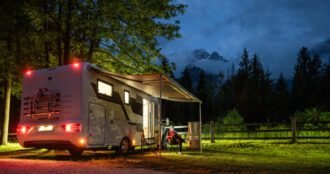“Where the Hell Am I?”: Former Campers Recall Trails Wilderness Program Death
- 1 Disturbing Events at Trails Wilderness Program Death
- 2 Camp Conditions Come Under Examining Close View
- 3 Humiliating Ceremonies Of Trails Wilderness Program Death
- 4 The Sleeping Arrangement For The Burrito
- 4.1 Concerns In History Of Trails Wilderness Program Death
- 4.2 Mixed Responses From Parents
- 4.3 Screening Of Limited Contact And Communication
- 4.4 Advocates Of Reform And Responsibility
- 5 Conclusion
A grassroots group focussing on abuse in the treatment of problematic teenagers said the autopsy result serves as a sobering reminder of the risks these institutions carry.
A 12-year-old lad sadly died in February 2024 after only one night at the wilderness rehabilitation camp Trails Carolina in North Carolina. Many people are left wondering what caused the heartbreaking result of his passing. Counsellors said the lad’s stay at the camp was marked by great suffering. Arriving “loud and irate,” he rejected lunch, suffered a severe panic episode, and then became unconscious the following day. With scant information now at hand, the reason for death is still under inquiry. But this episode of Trails Wilderness Program Death has raised questions for previous campers who say their stay there was profoundly traumatizing.
Disturbing Events at Trails Wilderness Program Death
Three former staff members and fourteen former attendees of Trails Carolina from 2013 and 2022 demonstrate a concerning pattern of abuse at the camp in interviews. Sent there as young teenagers, these ex-campers describe experiences with restricted access to restrooms, strip searches, and forced reading aloud of extremely upsetting letters from their parents. Many said their first days at the camp were bewildering, embarrassing, and frightening.
Sent to Trails Carolina the day following her 14th birthday, Rebecca Burney remarked, “I know if I had died on my first night, I would have died believing that I was unloved and unwanted.” Burney’s moving comments capture the feelings of other previous guests, notably Caroline Svarre, who remembered being driven to the camp by strangers in the middle of the night. “I’ve never shed so much,” Svarre remarked, relating her first day at Trails Carolina in 2013.
Camp Conditions Come Under Examining Close View
Trails Wilderness Program Death events surrounding the boy’s death have caused North Carolina’s Department of Health and Human Services to halt admittance to Trails Carolina until more research is conducted. The reaction included removing all eighteen youngsters from the camp. The camp insists that the boy’s death was unintentional despite these activities, and they underline again how staff members treat arriving youngsters with “compassion and patience.”
Trails Carolina has a history of controversy; former participants sometimes claim their treatment was cruel and emotionally taxing. The procedures of the camp, which include entry strip searches, have attracted especially criticism. Former employees said that occasionally, these inspections were carried out without pants, supposedly to stop kids from bringing in contraband. The camp’s administration, however, argues that these acts are required to provide security and comply with laws.
Humiliating Ceremonies Of Trails Wilderness Program Death
Children arriving at Trails Carolina are assigned sets of hiking gear and driven to cottages or campsites. Confusion and anxiety define the initial days. Former participant Lily, who visited the camp in 2018, remembered smelling strongly of pee and body odour when she arrived. At 13 at the time, Lily quickly discovered that many youngsters soiled themselves as the camp strictly limited restroom breaks on walks.
Shower access was just once a week, and poor basic hygiene added to a stifling environment. “I simply remember wondering, ‘Where the heck am I? Lily asked what on Earth this is.
A procedure wherein kids were obliged to read letters from their parents aloud to their bunkmates aggravated the emotional toll the camp took. Often, these letters focused on the reasons their parents had sent them to the camp and blamed the youngsters explicitly. Burney and other past participants claimed that this technique just made one more ashamed and isolated.
The Sleeping Arrangement For The Burrito
Children sleeping in what Trails Carolina referred to as a “burrito” was another alarming habit at the camp. Campers were confined under tarps folded over their sleeping bags on their first night, sometimes as a form of punishment, therefore restricting their mobility. To guarantee they would not try to leave, a staff member would sleep next to them.
Some campers, such as Alex Rudder, found this setup to aggravate their anxieties simply. “You couldn’t fall asleep,” Rudder remarked. “You would sit there and have panic episodes all night.”
A complaint against the camp, which also claimed that another camper had sexually molested a participant, cited the “burrito” approach. Trails Carolina has lately said that it would stop using the “burrito” in 2023.
Concerns In History Of Trails Wilderness Program Death
Since Trails Carolina’s opening in 2008, the sad loss of the 12-year-old youngster is the second death recorded there. A 17-year-old participant died in 2014 after incurring injuries trying to flee the camp. Following a 2023 check, campers had tried to leave 21 times between March and June, leading to confinement on 20 of those occasions.
Advocates like Meg Appelgate, CEO of the charity Unsilenced, say these numbers point to a structural issue inside the camp. “If people are running away from ‘treatment,’ that indicates you have a problem with that said treatment,” Appelgate added. Other advocacy groups, including Unsilenced, have been advocating for government control of wilderness treatment facilities, such as Trails Carolina.
Mixed Responses From Parents
Although advocacy groups and former attendees of the camp have levelled major complaints, some parents still support the program. Four parents contacted by NBC News reported good experiences with their children’s stay at Trails Carolina. Their youngsters have been able to manage serious mental health problems, including anxiety and depression, thanks, they say, to the camp.
One mother whose daughter was at Trails Carolina at the boy’s death said the camp was a “refuge” for parents who believed they had run out of other choices. David Bloom, another father, said the camp was life-changing as it gave his daughter the ability to control her anger and anxiety.
Screening Of Limited Contact And Communication
Though some parents have lovely comments, past campers provide a somewhat diverse picture of their family communication while at the camp. They explain how staff filtered messages to their parents, typically eliminating any reference to discomfort or discontent. Sometimes calls to parents were denied unless camp therapists decided they were “therapeutistically beneficial.”
At Trails Carolina in 2019, Zoe Aridas talked about how limited and under-control communication contributed to her isolation. “You only get to talk to your parents through letters,” she remarked. Aridas and other former participants said that staff members would delete whatever they produced, judged unsuitable or useless for their therapy.
Advocates Of Reform And Responsibility
The death of the 12-year-old youngster at Trails Carolina has drawn fresh focus on the problematic juvenile business overall. Advocates and past users of wilderness therapy programs, residential treatment centres, and boarding schools claiming to assist at-risk young people are pushing legislators to create government supervision and control of these entities. Currently, state-to-state control of these programs differs significantly, allowing leeway for abusive behaviours to flourish unbridled.
Along with other advocacy groups, Unsilenced has been urging Congress to enact the first-ever federal law controlling these initiatives, which they feel is required to safeguard underprivileged children. Although state agencies are under more pressure lately to tighten control without federal guidelines, many programs still run with little responsibility.
Conclusion
Former participants hope that their testimonies will help stop more damage as inquiries into the sad death of the 12-year-old at Trails Carolina proceed. Speaking out about the psychological and emotional effects their stay at the camp leaves, they are advocating more investigation and a review of Trail Carolina’s operations. The debate on how to best help young people stay active, even if the future of the camp is yet unknown. The stakes for the families engaged hardly be more significant as it guarantees that fragile children get not only efficient but also caring and humane treatment.

















